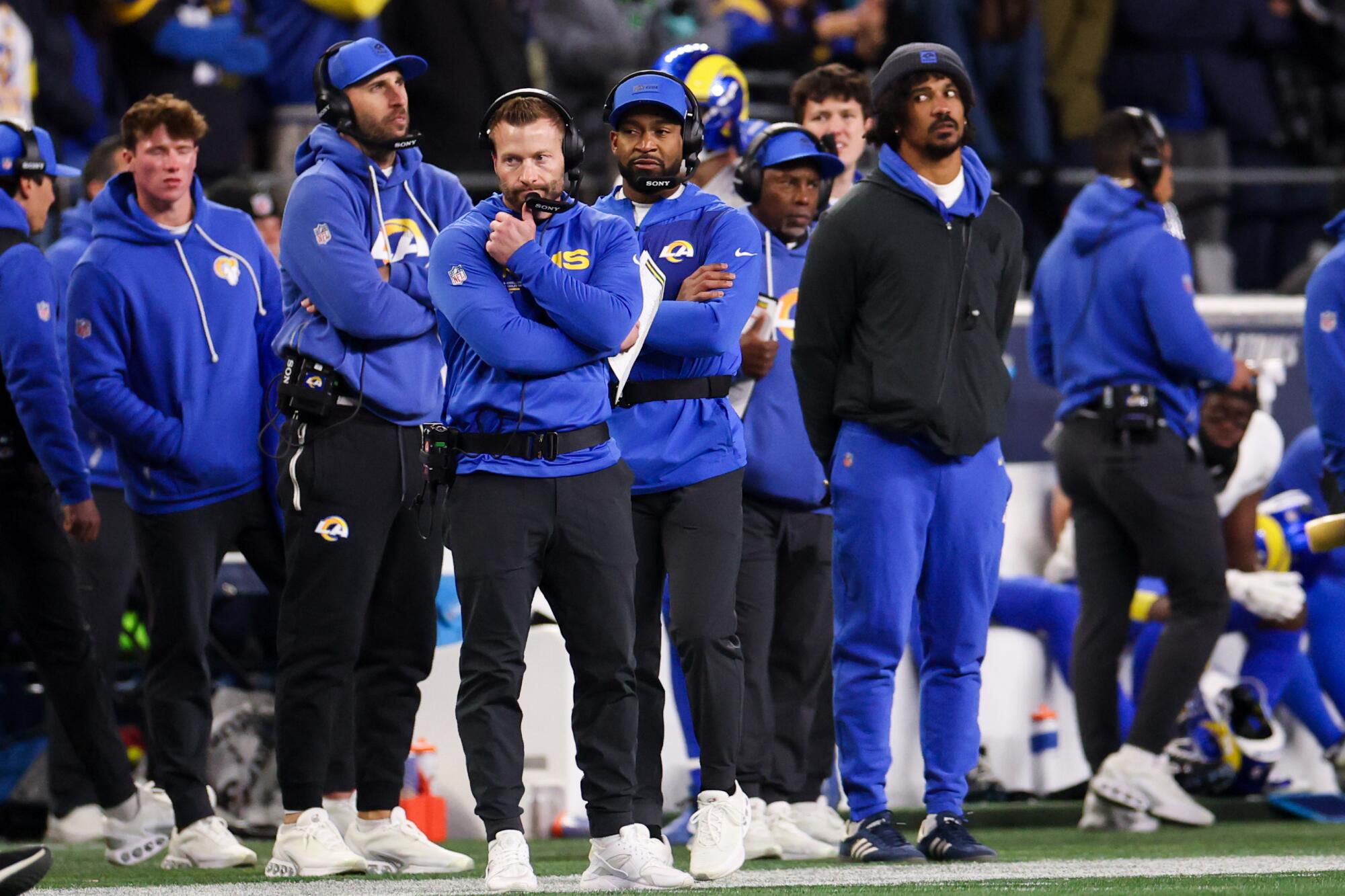Sean McVay deserves blame for Rams’ NFC title loss to Seahawks
Late in the mess that was the Rams’ final game of the season, Sean McVay was seen frustratingly burying his face in his play card.
That couldn’t hide the truth.
The Rams’ 31-27 loss to the Seattle Seahawks on Sunday in the NFC championship game must be draped on the deflated shoulders of the Rams’ resident genius.
As blasphemous as it sounds when referencing one of the greatest coaches in Los Angeles sports history, this one was on McVay.
A day after his 40th birthday, McVay coached like he was no longer the child prodigy, but instead an aging leader who leaves himself open to second-guessing.
McVay has rarely deserved criticism in his nine successful seasons here. But in the wake of an afternoon at Seattle’s deafening Lumen Field that should have propelled the Rams to the Super Bowl, this is one of those times.
A confusing final possession of the first half. Another special teams miscue. A bad decision to pass up a field-goal attempt in the fourth quarter.
It all added up to negatively impact a game the Rams could have won, and should have won.
“I love this team and I wasn’t ready to stop working with them,” McVay said. “This was a special year, it’s hard to fathom that it’s over.”
It shouldn’t be over. The Rams gained 479 yards against the league’s top-rated defense. They only committed four penalties. The offense didn’t have a turnover. Matthew Stafford was brilliant, 374 yards, three touchdowns, countless big throws.
The Rams were great, but during the biggest moments, they got goofy, and basically handed the Super Bowl invitation to the Seahawks on a grass-stained platter.
What was McVay thinking?

Rams coach Sean McVay watches from the sideline during the fourth quarter of a 31-27 loss to the Seahawks in the NFC championship game Sunday.
(Eric Thayer / Los Angeles Times)
Begin with the Rams’ possession at the end of the first half, after they scored a touchdown to take a 13-10 lead and their running game was rolling and they had a chance to capitalize on their momentum.
But instead of continuing to pound the ball and at least run down the clock, they threw twice in three plays, both incompletions, and had to punt after just 39 seconds, thus giving the ball back to the Seahawks with 54 seconds remaining in the half. Sure enough, the Seahawks then went 74 yards in 34 seconds, highlighted by a 42-yard pass from reborn Sam Darnold to Jaxon Smith-Njigba against Kam Curl and ending with a 14-yard touchdown pass to an uncovered Smith-Njigba to give them a 17-13 halftime lead.
The strategy by McVay was so flawed, it was actually criticized by Tom Brady on Fox, and Brady rarely criticizes anybody.
“The finality of all of it, I didn’t really expect this,” McVay said. “We had our chances … a couple of critical errors that ended up costing us. … I’m pretty numb.”
The next mistake occurred at the start of the second half with — surprise, surprise — more special teams struggles. This time it was Xavier Smith muffing a punt and Dareke Young recovering on the Rams’ 17-yard line. On the next play, Darnold hit former UCLA star Jake Bobo for a touchdown pass ahead of Quentin Lake to give the Seahawks a 24-13 lead.
“It was costly,” McVay said. “That was a tough one.”
-
Share via
Gary Klein breaks down what went wrong for the Rams in their 31-27 loss to the Seattle Seahawks in the NFC championship game at Lumen Field.
Special teams have haunted McVay for a couple of years. They were so bad earlier this season that he dumped the coordinator. It didn’t matter. They still stink. Coaches always talk about the three phases of the game. McVay clearly doesn’t have a handle on this third phase.
Even with all this, the Rams were driving in the fourth quarter with a chance to take the lead or at least make a dent in a four-point deficit when another decision went bad.
The Rams had rolled 84 yards in 14 plays and were facing fourth and four at the Seattle six-yard line. There was 4:59 left in the game. That was plenty of time to kick the field goal, take the points, then lean on the defense to stop mistake-prone Darnold long enough to drive back downfield for the winning field goal.
But, no. McVay decided to go for it, and Stafford ended up throwing a pass to a blanketed Terrance Ferguson, the ball fell incomplete, and the Seahawks held the ball until the last 25 seconds.
Take the points! C’mon man, take the points!
If the Rams were within a field goal of winning, the pressure on the Seahawks would have been enormously heightened and the momentum of the ensuing drive would have felt entirely different and even if the Rams still only got the ball back with 25 seconds left and no timeouts … that’s long enough for a field-goal drive.

Rams coach Sean McVay, right, shakes hands with Seattle Seahawks coach Mike Macdonald after the Rams’ 31-27 loss in the NFC championship game Sunday.
(Robert Gauthier / Los Angeles Times)
Granted, winning this game was a tough task. The Rams were trying to become only the sixth team to win three consecutive road playoff games. But they seemed up to the challenge and seemed destined to win … until they didn’t.
“A lot of resolve, a lot of resilience from our group, we just came up short,” McVay said.
The Rams will be back. Stafford has given no indication that he’s retiring, Puka Nacua isn’t going anywhere, the heart of the young defense returns and, of course, McVay is back.
One assumes his numbness will eventually disappear. One trusts it will be replaced by some of that resolve and resilience.

